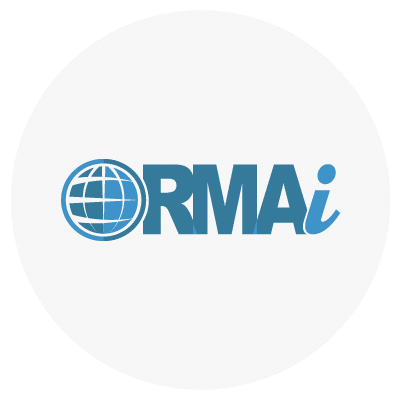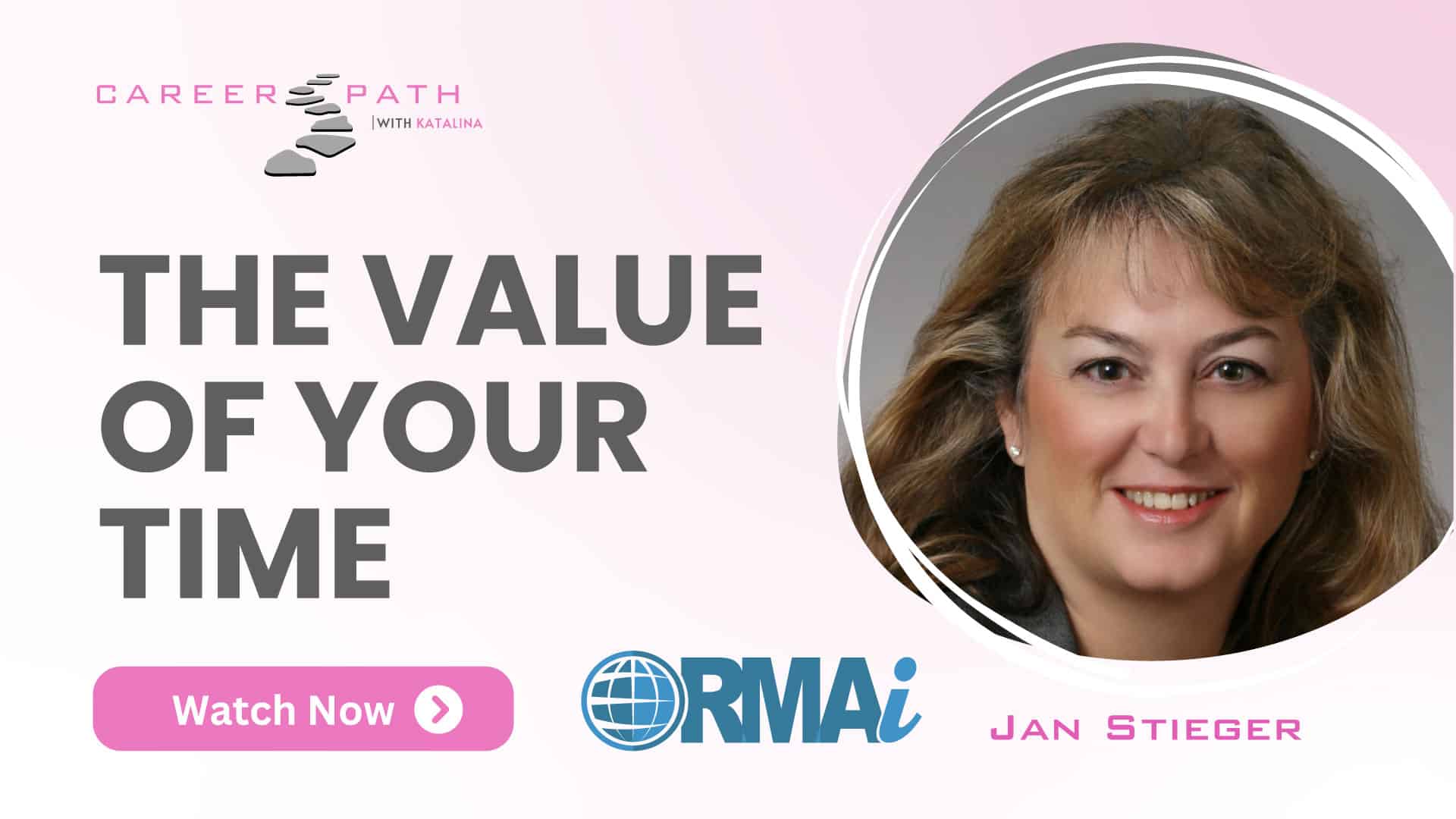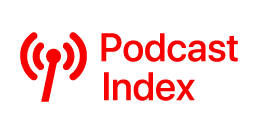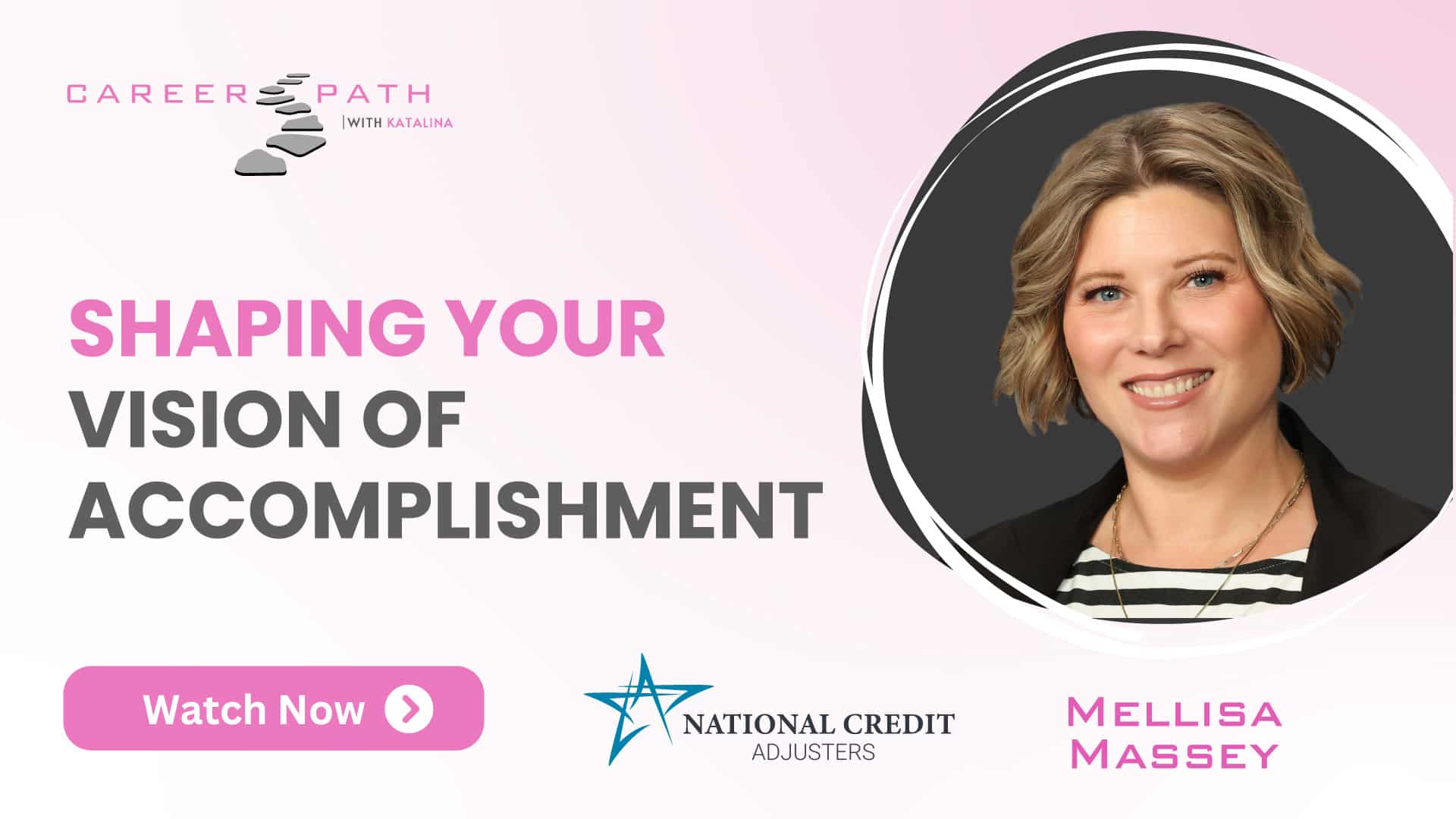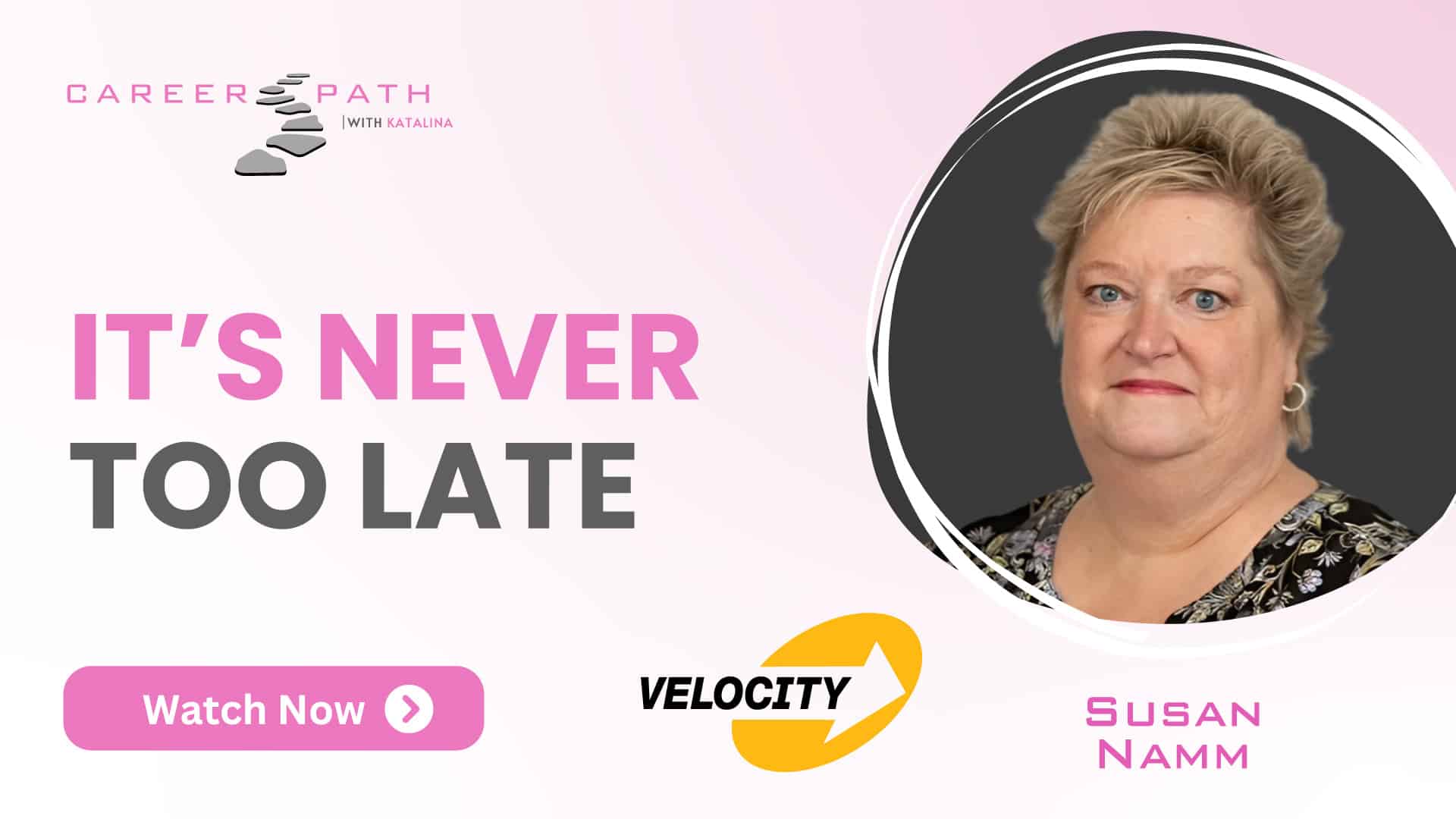Katalina (00:00.91)
Hello and welcome back to another episode of Career Path. I'm your host, Catalina. Today we will be discussing the value of your time. And here to discuss this with me today, I have Jan Steeger. Now Jan has been the Executive Director of RMAI for the past 13 years. And it's only this year in May that she will be stepping down. And Jan, I wanna thank you so much for all you have done during your time at the Association for the Association and...
for our industry and also big thank you for coming on with me today. It is such a pleasure to have you. So thank you for all you've done. And it's so great to have you. And I would love to start this by having you tell a little bit about yourself and how you got to where you are today.
Jan Stieger (00:38.724)
Thank you. My pleasure to be here.
Jan Stieger (00:51.524)
Well, I think the most important thing is that I've represented the accounts receivables management industry for over 20 years, but I have never once worked in a collection agency or for a debt buyer or actually worked in the industry. Because my career has been in association management and it actually started when I was in college.
and I did an internship with the California Optometric Association. And I did my internship. I did a little bit of part -time work. Opportunities arose there where I could work full -time in the summertime and then do a little bit more work. And by the time I graduated, I actually had a full -time job at the Optometric Association.
And the way it works in associations is that you can grow into associations. And then when you're ready to move to, when you're ready, like sort of hit your maximum out of association, you move to a larger association. So my time at the COA, I was actually there for 15 years and I grew from an internship all the way up to director of government affairs at some time. My specialty actually was in events and education.
And at some points I actually served as interim executive director while when there were vacancies. From there, I was time to for more growth. And so I went over to the California Pharmacist Association, a larger association, more members, bigger budget, larger staff. And there I did a lot more specialized work in education and events and conferences. They had a lot more events going on.
But at there too, you get to, you grow as much as you can. And, but I could never grow into the top leadership there because they actually required their exec to be a pharmacist. So luck would have it. I had a friend over at the California Collectors Association and California Association of Collectors, sorry. And that's the ACA unit of ACA, the CAC is the ACA.
Jan Stieger (03:06.02)
the California unit of ACA. And I moved over there as the executive director. So I had to go, I went from a large state association to a smaller state association, but I could jump up to the next level. So I did that and I stayed there, I think about 10 years. And at that point, Army I was DBA international and I was ready for a change, but I was also wanted.
Every time an association person changes jobs, you actually have to learn a new profession. So I needed to learn about optometry, learn about pharmacy, learn about collections. And so the job for the executive director of DBA at the time came open. And it was my first, it was a growth opportunity because now I was going to a national association from the state association. And so that was a big growth. And the
And the benefit of it was that I already knew about the collection agency. I had to learn the nuances of that by, but I was already familiar with the FDCPA and many of those, many of the sort of the basics of it. So that's how I got here. And when I came on DBA was managed by an association management firm, but I knew at the time that they wanted to have their own staff. And so.
That's when I took over in 2011. I actually opened the Sacramento office and we've grown from there. We now have nine staff.
Katalina (04:41.998)
That's fantastic. Thank you for sharing so much about your past. That's amazing. And it's very interesting to hear about an association management career path and not just within the receivables management. It is interesting how it's both different but extremely intertwined how each time you switch associations, like you said, you almost had to become a Jack of each and every trade to fully be a part of it.
Jan Stieger (05:07.044)
You do, but almost all associations, I mean, of course there's exceptions, but all associations essentially work on the same premise. And that is that the board of directors is a voluntary board of directors and you have, you know, the officers and such like that. And that's the board's role to set the strategy and the vision and the policy for the association. And it's the executive director's role to carry out that vision or care. And so.
What I can do is, what I bring to the table in an association is the board says what they want to accomplish and then I tell them, or I say, this is how we do that. How do we do that? And in many, it's very similar from associations. I actually belong to the American Society of Association Executives. So we have our own association and we do education on how to manage associations.
Katalina (06:03.982)
Very interesting, that's very cool. And I'm sure both in that and just at RMAI, time and time management has been extremely important in everything that you do. So that rolls right into what we're discussing today, that value of your time. And I wanna start with your opinion about how important your time is.
Jan Stieger (06:27.78)
Well, it's extremely important because every minute of my day spent in my job is to promote an industry. And that's when RMAI gets their best value is when I'm working or directing or overseeing projects and programs that are providing member benefits and providing services for our members. So how I spend my time there is...
Trust me, there is always a long to -do list that you never get to check everything off. And there are many days that you go to work and you get nothing on your to -do list checked off because there's a bad press report or there was an enforcement action or a lawsuit or a piece of legislation introduced that just really is the priority and demands your attention. So you have to be very, very flexible. And you have to...
to your point about balance, you have to learn how you can't stay at work till the job is done because the job is absolutely never.
Katalina (07:35.182)
Fair point. But how would you optimize your schedule to make the most out of the time you have and try to get those most important things done?
Jan Stieger (07:44.58)
Right, so I'm kind of a firm believer that in order when you're mentoring or you're growing your staff, that the most important thing for efficiency is to take the task and decide the lowest level, I don't wanna say the lowest level employee, but the person who has the minimum qual, who, okay, the person who has the minimum qualifications, you know, sort of lowest on the total pool.
that can actually do the job. So you push it down to there. It does two things. First, it provides opportunities for them to grow. But secondly, in, you know, it's the efficient use of your resources. I don't want somebody that I'm paying, you know, three times more to do a job that I can have somebody who's making a less salary do that. So I believe a lot in that to do that. And then I've also.
I will submit. So on all my associations that I've belonged to, spent time with my, um, I've actually always grown in them and got really into the weeds at the very beginning and learned how to do every task. I mean, RMAI, I absolutely had to, we didn't even have an office. So I had to learn to do every single task and then train the next employee. But what that has done, it has given me a very solid foundation.
And it allows me to make very quick decisions because I already understand the hows and the whys of everything that we do. And then you sort of have to push yourself to say, I'm going to make that decision. I know it's the right decision. And I'm not going to get paralyzed by saying, oh, I wish I had just a little bit more information or a little bit more data to make that decision. I think at some point you just have to trust yourself that you know.
what's good for the association, you know what needs to be done and you just make them.
Katalina (09:44.398)
So it sounds like the way to optimize your schedule in your eyes is to first educate yourself about your role inside and out and second through strategic delegation. Is that correct?
Jan Stieger (09:58.596)
That's absolutely correct. Yep. Yep.
Katalina (10:00.238)
Okay, good, I'm glad. So I also am very curious to hear about your perception of what the difference is between personal time and free time and how to balance that with work.
Jan Stieger (10:15.3)
Right. So in my position, I travel a lot and I actually believe that my, the highest and best use of my time is when I'm out promoting RMAI either before policy members or testifying before legislators or going to conferences and speaking about who we are and what our members do or.
going to our other associations and talking to our members and just, you know, talking about making sure that they're taking advantage of all of our member benefits and talking to affiliates and all that. So I believe that's the very best time. That is when I am doing my best work. But traveling does take a lot of effort and it takes a lot out of your personal life because not only are you
not home eight to five when you're normally at work, but you lose all your evenings, your personal evenings and things like that. And yeah, you might be out eating or visiting new cities and things like that, but you actually lose a lot and you lose the ability to get a lot of your chores done during the week. And so for me, it's always been important to be able to...
ground myself where I am. And so I bring projects with me. I always bring something I'm working on at home. It could be a craft project. It could be some tasks that I need to get done that I can travel with. And I bring those with me and I do them in the hotel room in the evenings. And that way, I'm not quite so far behind. I feel like I'm doing something for my personal life. But...
It also, but I think it's good use so that when I get back home, I can do the things that I'm not able to do while I'm trapped.
Katalina (12:07.79)
That's fantastic. I love that so much. And that idea of kind of grounding yourself while you're busy, just spun out of control traveling because gosh, it is crazy when you're waking up super early, you're going to bed super late. Yeah, it can really throw you off. So I love that idea so much. Similar to that, how do you utilize your time very well without risking burnout? Now, I know that
Jan Stieger (12:16.196)
Thank you.
Jan Stieger (12:25.956)
Right. Right.
Katalina (12:34.03)
traveling and conferences, things like that are more of a unique situation, but in your everyday, what is that kind of balance? You kind of talked about it earlier too when you said, you can't stop when the work is done because the work is never done.
Jan Stieger (12:47.524)
Right.
Well, I think, you know, that people will say if you love your job, you never work and you never work a day in your life. And there is some, there is some truth to that. So if you like what you're doing, you believe that you're contributing and to whatever your job is or whatever you're working towards. I think there is some satisfaction. So.
You know, if you're not getting satisfaction out of your job, you're really in the wrong one because then it is, you know, literally work. So for me, I'm not, I love my job. I love, you know, doing successful events. I love victories. I love, you know, victories in the press, victories in the legislature or with regulators. So for me, it's not, and I'm also a person that does not like surprises at all.
And so people will tell you, oh, don't do, you better tell her because she'll find out and she doesn't like to be surprised. So I don't like surprises. And so I do, you know, look at my emails over the weekends. I look at them in the evening, but I don't find it like, oh gosh, I'm, you know, I've got to go back to work for an hour. I just flip through.
get a sense of what's going on. Is there anything that's going on that I can quickly solve so that other people can move forward? Or is there just something that I need to be aware of? I'll think about it until when I go to the office the next morning, I'm ready to, like, I know that I need to do something about that. So I do think that, and I don't find, you know, people say, well, don't you hate working every day? Well, you know what, I don't. I mean, it's, I don't mind.
Jan Stieger (14:37.476)
reading things and keeping up on the industry. I mean, there is so much material and news that comes out from this industry every single day. But I just read it and it's become a part of my life. And I think when it becomes a part of your life, it's not a burden at all.
Katalina (14:58.926)
So it's about finding joy in what you do and keeping your finger on the pulse so you never get left in the dust, it sounds like. And I love what you said about finding that passion in what you do. And when I first joined this industry, that was one of the questions that I personally had is like, well, being in receivables management or the worst term of debt collection, a lot of people have a bad vision of this industry.
Jan Stieger (15:06.404)
Right, right.
Jan Stieger (15:12.42)
You ready?
Katalina (15:27.982)
But what we do is actually so critical to the credit ecosystem. If you don't have our industry, the entire credit system of our country crumbles. So what we're doing is incredibly important. We are helping hold up the entire financial ecosystem, essentially. So when you think about it in those terms.
Jan Stieger (15:50.756)
Well, that could be more true. And if you don't philosophically believe that, you cannot work in this industry because you have to, to your point, have passion about it and believe that what you are doing is the right thing. So I know at RMAI, consumer protection, obviously we're here to make sure that the accounts receivables industry.
is a viable industry and to your point plays an important role in the credit ecosystem. But, you know, always with always knowing that truly we need to make sure that whatever we are doing, whatever policies we're adopting, whatever programs or education programs that they are consumer protection focused because.
you know, we need to, in the greater world, our job really is to rehabilitate financially consumers out there so that they can be a part of the credit ecosystem that we live in. You can't rent a car, you can't check into a hotel without a credit card. Credit is such a fundamental...
Jan Stieger (17:01.092)
me credit. I don't call it, I was going to say a fundamental right. It is not a fundamental privilege that we all have. And it's our job to make sure that it continues to be available to consumers.
Katalina (17:15.278)
Absolutely. Now, when you and I first were discussing this topic and having you come on the podcast, you said something that I thought was brilliant. And I would love for you to talk about it a little bit more. You said, time equals experience. And you talked about how influential that is. Would you like to share a little bit more about that?
Jan Stieger (17:38.244)
Well, I mean, I think that you grow into yourself and you grow into your profession and you grow as a professional. And I don't think there's any shortcuts to that. I think that you need to, you know, gain that experience that is so critical. And to what I said earlier, that experience helps you make decisions, you know, down the road, you know, years later when you...
because you just have the confidence to know that I've seen that situation before. I understand, I understand the unintended consequences if I make that, if I do something. And so I think that, I don't think there's any shortcut. And I think, I know there's a lot of times when we're hiring some younger employees and they want to say, oh, I want to do what you do.
Well, I've been doing it for 50, 40 years. You can't just do what I do by being here for a couple of months and saying, I'm ready to do that. I mean, certainly there's a role as professionals and leaders to train and educate and bring people along with you and so that they have professional growth and that they are our future leaders and to...
sort of mentor them along and you know how to be a good manager and a lot of that you don't learn in the textbook and so but I don't think there's any substitute for experience in what I would say is paying your dues.
Katalina (19:10.958)
That makes a lot of sense. I really, really love that and how passionate you are about gaining that experience and how valuable it truly is. That truly is the value of your time, our whole topic for today. And that's actually perfect because that is all the time we have for today. So Jan, I wanna thank you so much for joining me today, for sharing your experience and your insights. Thank you, it was incredible to have you on.
Jan Stieger (19:23.012)
That's right.
Jan Stieger (19:37.092)
Thank you so much, I've enjoyed it a lot.
Katalina (19:39.438)
Fantastic, I'm so glad. And to our listeners, if you have any questions, comments, or even topics that you would like to see us discuss, please leave them in the comments below and we will try to get to all of them. We'll do our best to respond. Thank you for everyone for joining us today and I look forward to seeing you again in our next episode.
Ready?
